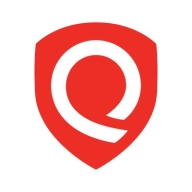

Qualys Web Application Scanning and SonarQube Server both compete in the domain of application security and code quality analysis. Qualys seems to have the upper hand in security-related features, while SonarQube excels in code quality and multi-language support.
Features: Qualys Web Application Scanning is known for its integration with Selenium IDE, protection against zero-day vulnerabilities, and comprehensive reporting. It provides ease of use with API access for automation and delivers detailed reports. In contrast, SonarQube Server is favored for its multi-language support and extensive code quality analysis. It offers ease of integration with CI/CD pipelines and allows customization of quality gates and rules.
Room for Improvement: Qualys Web Application Scanning could benefit from reducing false positives, enhancing user management, and improving integration with additional security standards beyond OWASP. SonarQube Server is noted for requiring better handling of security vulnerabilities, enhanced API documentation, and improved support for emerging programming languages.
Ease of Deployment and Customer Service: Qualys Web Application Scanning supports deployment flexibility across various cloud environments and is cloud-based, though some users desire more proactive technical support. SonarQube Server is primarily deployed on-premises, appreciated for its deployment flexibility and open-source nature, though users seek improved support documentation and responsiveness.
Pricing and ROI: Qualys Web Application Scanning is considered expensive but delivers good ROI through automation and reduced web application failures, with a licensing model based on assets. SonarQube Server, being open-source, provides considerable cost savings and excellent value, especially for large-scale use, despite some paid plugins.
I have seen a return on the investment from SonarQube Server (formerly SonarQube) because the value it adds relates to static code analysis and vulnerability assessments needed for our FDA approval process.
We see productivity increasing based on the fact that the code review is mostly automated, allowing the developer to fix the code themselves before assigning it to someone else to review, thus receiving that ROI.
Once we purchase the license, we have access to top-notch support.
I have dealt with Qualys's technical support, and any enhancements are challenging.
They showed us where we can actually get those granular level reporting extracted for Excel, which was a quick guide.
I would rate the technical support for SonarQube Server (formerly SonarQube) as a 10 because we have not faced any specific issues that required us to contact tech support, which is a very rare case.
The community support is quite effective.
At one point, there was a limitation on reporting for 100,000 assets at a time.
It is licensed for assets, so we just contact the team for additional licenses if needed.
I would rate the scalability of SonarQube Server as a 10 because we can configure the server to scan multiple projects based on the number of lines.
I find SonarQube Server (formerly SonarQube) very scalable because we're able to create a new repository and integrate all the tools on that project and it just works.
I think SonarQube Server (formerly SonarQube) is stable, and we did not face any problems unless there was a power outage or if the LAN cable was plugged out.
With the growing reliance on AI, Qualys Web Application Scanning should be updated to handle AI-based applications and LLM-based attacks.
One area of improvement is reducing false positives by prioritizing agent findings over remote findings when there is a corresponding local agent finding.
I would like it to be cheaper because it is a bit expensive compared to competitors like Tenable Nessus.
Currently, it should also be able to analyze the code and generate and fix the code for specific developers or features that the developers are tracking.
If I fix some vulnerabilities today, they reappear in the next scan, and there will be completely different issues that need to be fixed.
They offer discounts on bulk licenses, making it cheaper compared to competitors like Veracode DAST.
I find it a bit expensive compared to other competitors.
I would rate the pricing for SonarQube Server (formerly SonarQube) as an 8, where 1 is very cheap and 10 is very expensive, because Coverity is very expensive, and while SonarQube is not cheap, it is still less expensive than Coverity.
They always offer around a two-year contract, but we always take a one-year contract because it's expensive.
The freemium version of SonarQube Server offers excellent value, especially compared to the high costs of Snyk.
It effectively detects vulnerabilities like the OWASP Top 10 without any issues in reporting.
It is recognized as one of the best tools for web application security from a development perspective.
The product helps by providing options for remediating vulnerabilities it finds, making it really useful.
We use SonarQube Server's centralized management and visualization of code quality metrics on the dashboard because that's the executive dashboard that we send to the executives to show where we are in terms of quality, security, and where the company can improve.
The most valuable features of SonarQube Server (formerly SonarQube) for us include having control of the rules, enabling and disabling them.
Some of the static code analysis capabilities are the most beneficial.


Qualys Web Application Scanning (WAS) is a fully cloud-based web application security scanner. The scanner will automatically crawl periodically and test web applications to discover potential vulnerabilities, including cross-site scripting (XSS) and SQL injection. The consistent testing equips the automated service to generate consistent results, lessen false positives, and offer the ability to scale to protect thousands of websites effortlessly.
Qualys Web Application Scanning is bundled with different scanning technology to carefully scan websites for malware infections and will send notifications to website owners to assist in preventing blacklisting and brand reputation damage. As digital transformation takes place in various organizations, Qualys WAS gives organizations the ability to track and document their web app security status through its interactive reporting capabilities.
Qualys WAS empowers organizations to remediate any web application vulnerabilities quickly. Some of the key tools offered are:
Benefits of Qualys Web Application Scanning
Qualys Web Application Scanning offers many benefits, including:
Reviews from Real Users
Qualys Web Application Scanning stands out among its competitors for a variety of reasons. Two of those reasons are its progressive scan and quick detection of vulnerabilities.
P.K., a senior software developer at a tech vendor, writes, "The feature that I have found most valuable is the progressive scan. It is good. It's done in 24 hours."
Nagaraj S., lead cybersecurity engineer at a tech service company, notes, "I have found the detection of vulnerabilities tool thorough with good results and the graphical display output to be wonderful and full of colors. It allows many types of outputs, such as bar and chart previews."
SonarQube Server enhances code quality and security via static code analysis. It detects vulnerabilities, improves standards, and reduces technical debt, integrating into CI/CD pipelines.
SonarQube Server is a comprehensive tool for enhancing code quality and security. It offers static code analysis to identify vulnerabilities, improve coding standards, and reduce technical debt. By integrating into CI/CD pipelines, it provides automated checks for adherence to best practices. Organizations use it for code inspection, security testing, and compliance, ensuring development environments with better maintainability and fewer issues.
What are the key features of SonarQube Server?Many industries implement SonarQube Server to uphold coding standards, maintain security protocols, and streamline their software development lifecycle. In sectors like finance and healthcare, adhering to regulations and ensuring reliable software is critical, making SonarQube Server invaluable. It is often integrated into CI/CD pipelines, ensuring that code changes meet set standards before deployment. This approach enhances productivity and maintains compliance with industry-specific requirements.
We monitor all Application Security Tools reviews to prevent fraudulent reviews and keep review quality high. We do not post reviews by company employees or direct competitors. We validate each review for authenticity via cross-reference with LinkedIn, and personal follow-up with the reviewer when necessary.